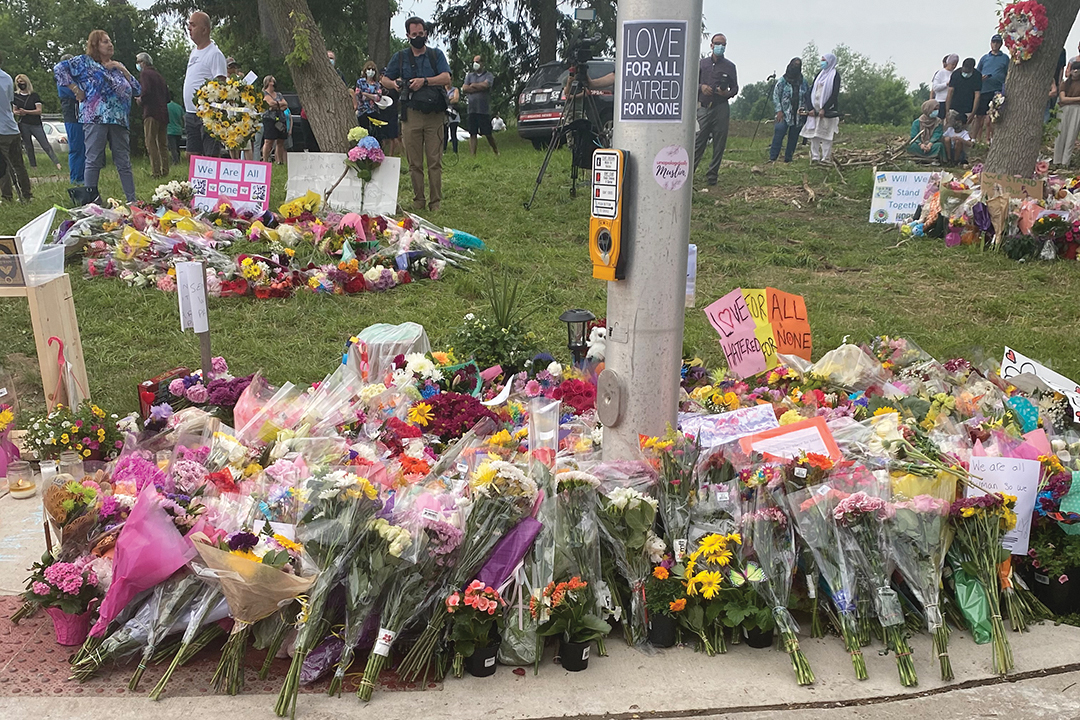Content warning: This article contains discussions of Islamophobia and Islamophobic violence.
Salman Afzaal, Madiha Salman, Yumna Afzaal, and Talat Afzaal, four members of a Muslim family from London, Ontario, are dead because a terrorist ran the family over with his car on June 6, 2021. Fayez, a nine-year-old member of the family, survived but was seriously injured.
A CBC News article compiled profiles on each of the deceased. Madiha Salman was a PhD student at Western University, and is remembered by one of her students as a dedicated teaching assistant. Her husband, Salman Afzaal, worked as a physiotherapist in seniors’ living centres and was described by CBC News’ interviewees as sunny and positive. Their daughter Yumna Afzaal was a high school student who excelled in her academic life and impressed her teachers despite the challenges of doing high school online.
The London attack is part of a larger pattern of violence against Muslim people across the world. The Varsity interviewed Muslim students and faculty, who reflected on Islamophobia in Canada.
Student unions’ responses
“Tragedies like this force us to confront the reality that Islamophobia, hate, and vitriol continue to exist within our communities,” read a statement made by the Muslim Students’ Association (MSA) on June 10.
In an email to The Varsity, Basmah Ramadan, vice-president external of the MSA, cited the Anti-Islamophobia Community Working Group as a positive step toward policy change from the administration that would help Muslim students and expressed hope that it would be followed by continued efforts against Islamophobia at U of T.
The Arts and Science Students’ Union (ASSU) also responded with a statement, writing that it was “horrified” and likening the attack to other instances of violence against Muslims in Canada. It called for the community to reflect on their own personal biases following the attack.
Faculty initiatives
In a collection called Reflections on the London, Ont. murders, Anver Emon, director of the Institute of Islamic Studies at U of T, linked the London murders to the “erasure” of Muslim people in Canada. He described them as a symptom of Islamophobia in Canadian public policy.
He cited Quebec’s legislation against religious symbols in certain occupations as another example, writing that the legislation results in the dehumanization of Muslim women and “other racialized minority women.” Emon also pointed out gaps in Canada’s archives, which lack data on Muslim Canadians and offer few acknowledgements of their contributions, leading to inadequate representation of Muslim Canadians in public policy.
Dr. Youcef Soufi, from the Institute for Islamic Studies, wrote part of Reflections on the London, Ont. Murders alongside Emon. Soufi spoke to The Varsity about how the collection came to be. He said, “our objective was… to use our academic skills… to contribute to a public sphere. And it was also an act of mourning together — an act of solidarity.”
Soufi said that the collection includes both personal and academic writings. For the latter category, contributors wrote about topics including the difficulties faced in persuading public officials to implement well-researched interventions for Islamophobia.
Muslim students at U of T respond
In an interview with The Varsity, Soban Atique, a current student at U of T, spoke about the various responses to the terrorist attack in London. He said that responses from government officials were “lacklustre,” noting that pressure from the public was required to make Doug Ford refer to the incident as a terrorist attack. Atique also said that he was encouraged by the large number of people who attended the vigil for the victims that was held at U of T.
Atique talked about the importance of reading Muslim authors and consulting with Muslim people when Islamophobia is being discussed in the media.
He also stressed the importance of lived experiences when talking about issues that affect Muslim people. “You can’t tell me my fear is irrational,” he said, when talking about anti-Muslim violence.
Recent UTM graduate Muzhda Iqbal said in an interview that she had a positive experience at UTM and would encourage others to attend the school as well. “I thankfully never faced any racism… because of my religion or skin color [at UTM],” she said. Iqbal added that she felt that the administration should be commended for creating a welcoming environment.
She attributed her positive experience in part to the prayer rooms U of T provides for students, which have separate areas for men and women, as well as accommodations for various sects of Islam. Iqbal also mentioned accommodations from the university for religious holidays.
In an interview with The Varsity, current U of T student Sarah Rana said she feels that the university is failing to create a tolerant academic environment surrounding issues affecting Muslim people — in particular, issues that affect Palestinian and Uighur people.
As an activist for Muslim Uighurs, she has faced skepticism from her peers about the genocide that Uighurs are experiencing. She recounted messages from students that told her to “shut up” about her activism.
Rana also discussed the depiction of Muslims in the media, describing the problematic nature of stories that assign anyone who is Muslim a role on a spectrum somewhere between “moderate” to “extreme” according to their appearance.
“People don’t realize that Canada is becoming deeply Islamophobic,” said Rana. She urged people to seek out information about Islam from friends who are Muslim and from Muslim religious leaders as opposed to the internet.


